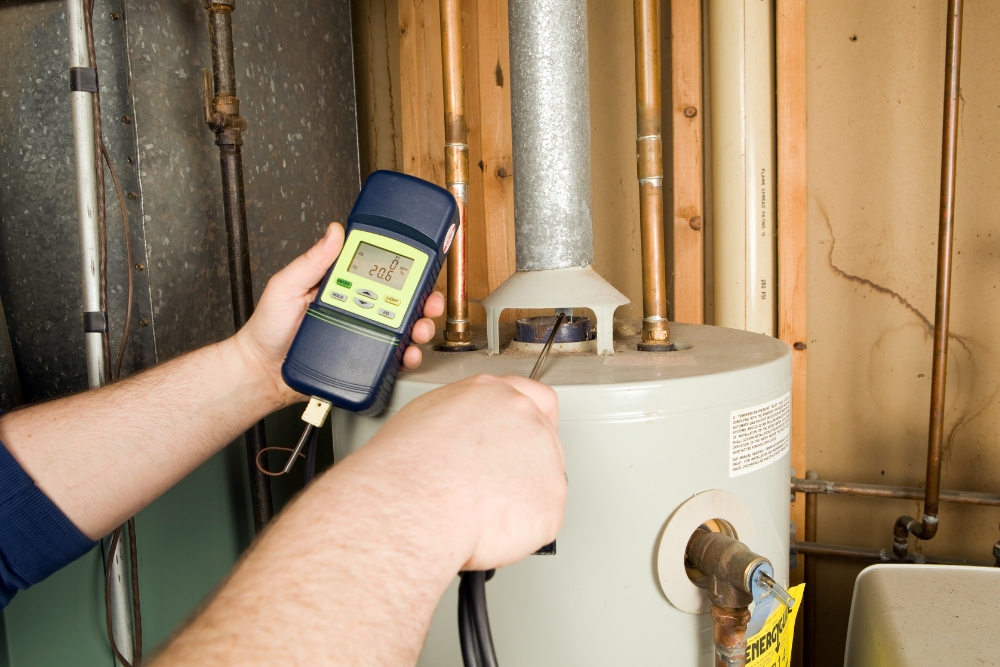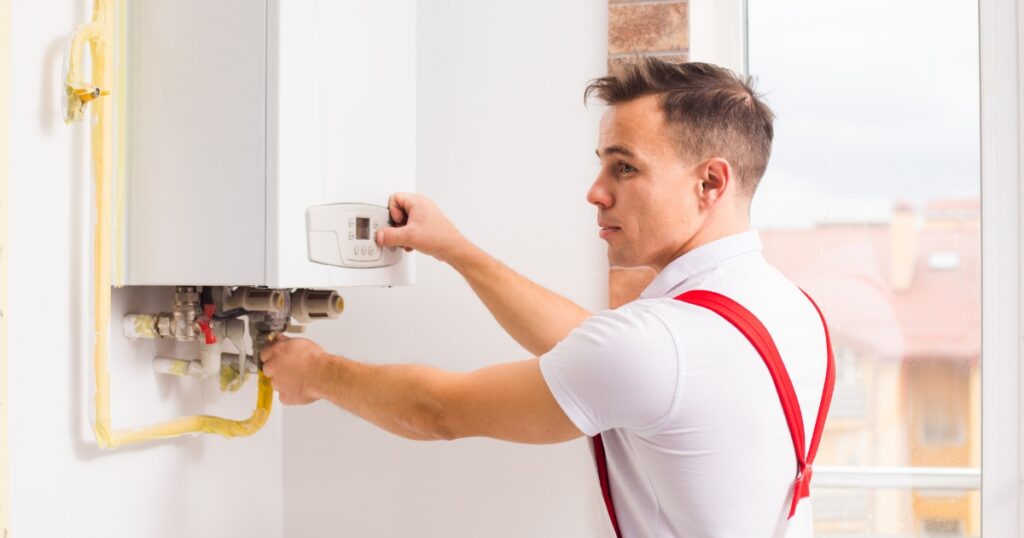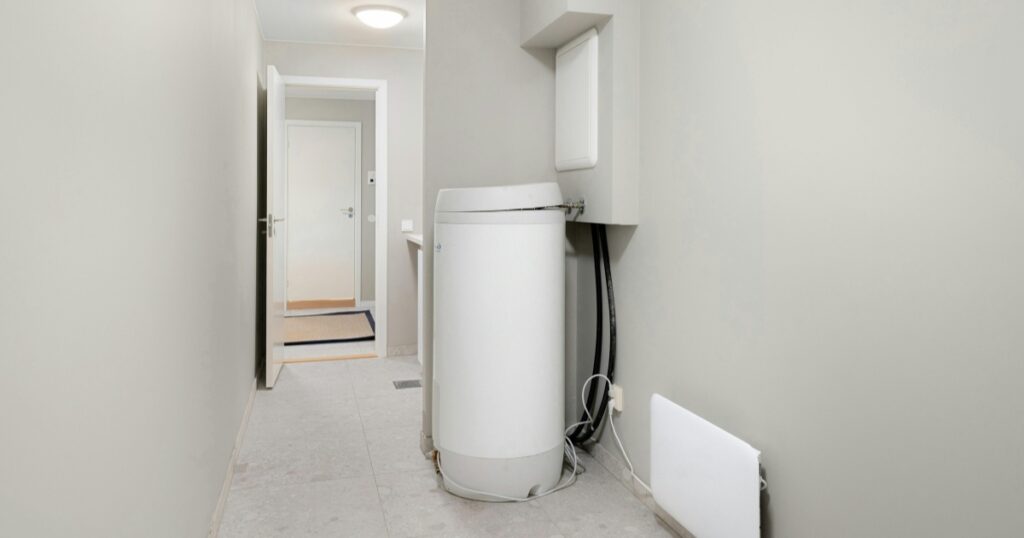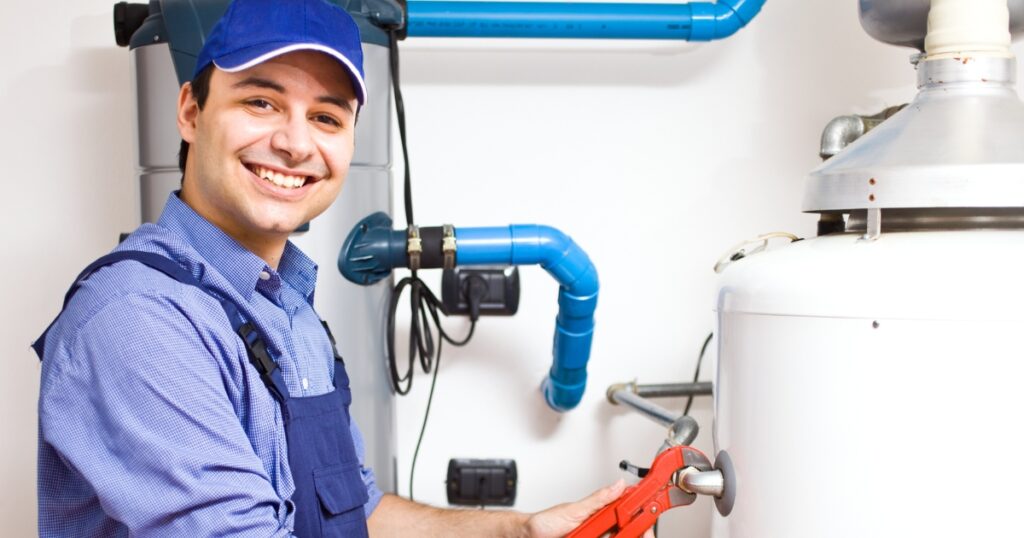Ever found yourself having a whinge about the water temperature during your shower because it’s either scalding hot or freezing cold? We know how that can put a spanner in the works for your daily routine.
It turns out, a little bloke called a thermostat is often behind these temperamental temps. And get this – by tweaking your thermostat just right, you could pocket an extra 5-10% in energy savings! Our yarn today is all about thermostats and their knack for keeping your showers from turning into unexpected polar plunges or accidental saunas.
Key Takeaways
- Thermostats are essential in hot water systems to keep showers at the right heat, avoiding those chilly shocks or scorching burns.
- Different types of thermostats like electric, digital, and smart ones can save energy and money while giving precise temperature control.
- Having a well-functioning thermostat means your hot water’s consistently comfortable and safe – plus it stops you from wasting power or damaging your system.
- Top-notch thermostat tech is on the rise with things like remote controls through smartphones for an easy life and even bigger bill savings.
- Regularly checking your thermostat keeps everything running smoothly; consider upgrading to a smart one for the best control over that precious hot water.
Understanding the Function of Thermostats in Hot Water Heater Systems
Thermostats play a crucial role in controlling the temperature of water in water heater systems. They ensure that the water is heated to the desired temperature and maintained at a consistent level.

Different types of thermostats, such as electric, digital, and smart thermostats, offer varying levels of precision and energy efficiency.
How thermostats control water temperature
We trust our thermostats to keep the water temperature in our hot water systems just right. These clever devices act like vigilant guardians, constantly sensing the water’s heat level.
If things get too cold, they wake up the heating elements in electric heaters or signal the gas burner in gas models to fire up. As soon as they detect that perfect preset warmth, they’ll dial things back down.
It’s all about maintaining that sweet spot where we enjoy comfortable showers without scalding our fingers or wasting energy.
Setting your desired temperature is a breeze with these thermostat sensors tucked inside your heater. They respond instantly to even slight dips below your chosen temperature setting by activating the heat source quickly and efficiently cooling off when it hits its mark again—no fuss needed from us! This keeps everything running smoothly and helps us avoid those unexpected icy surprises during what should be a nice warm shower after a long day.
The importance of well-functioning thermostats
Well-functioning thermostats are crucial for maintaining the ideal water temperature in your water heater system. Properly functioning thermostats play a significant role in ensuring energy efficiency and preventing overheating or underheating of water, which can lead to discomfort and even safety hazards.
A malfunctioning thermostat can result in inconsistent water temperatures, wasted energy, and potential damage to the water heater system. Regularly checking and maintaining your thermostat is essential for optimal performance and peace of mind.
Types of thermostats (electric, digital, smart)
Electric, digital, and smart thermostats are the three primary types used in water heater systems.
Electric Thermostats
- These are commonly found in traditional water heaters and are cost-effective.
- They use a simple mechanism to control the water temperature by activating or deactivating the heating element.
Digital Thermostats
- They offer precise temperature control and improved energy efficiency.
- Equipped with digital displays, they provide homeowners with accurate readings and easy programming options for optimal comfort.
Smart Thermostats
- These advanced devices can be controlled remotely using smartphones or other connected devices.
- Smart thermostats are designed to learn your heating habits, offering personalised temperature settings and automated adjustments for enhanced energy savings.
Advancements in Thermostat Technology
With advancements in thermostat technology, homeowners can now enjoy greater precision and energy efficiency in controlling their hot water systems. Connectivity and automation features also make it easier to monitor and adjust water temperature settings for optimal comfort and convenience.
Precision and energy efficiency
When selecting a thermostat for your water heater system, it’s important to consider precision and energy efficiency. A precise thermostat ensures that the water temperature is accurately maintained, providing you with consistent and comfortable hot water when you need it.
By choosing an energy-efficient thermostat, you can reduce your energy consumption and ultimately lower your utility bills without sacrificing comfort or convenience.
By prioritising precision and energy efficiency in your choice of thermostat, you can enjoy reliable control over your water heater system while also minimising its environmental impact.
Connectivity and automation
Today’s advanced thermostats offer connectivity and automation features that enable you to control your water heater system remotely. With the use of smart thermostats, you can easily adjust temperature settings and monitor energy usage through smartphone apps or other connected devices.
This innovative technology provides convenience and flexibility, allowing homeowners to efficiently manage their water heating system regardless of their location.
Smart thermostat systems also offer automation capabilities, such as learning your household’s heating preferences and automatically adjusting settings to optimise efficiency. These advancements in thermostat technology not only provide greater comfort but also contribute towards reducing energy consumption and lowering utility bills over time.
Recommendations for homeowners
After discussing advancements in thermostat technology such as connectivity and automation, homeowners need to consider the following recommendations to ensure optimal performance and energy efficiency of their water heater systems:
- Regularly check and calibrate your thermostat to maintain accurate temperature control and prevent overheating or underheating.
- Consider upgrading to a smart thermostat for enhanced control and energy savings. Smart thermostats can be programmed to adjust temperatures based on usage patterns.
- Ensure proper insulation around the water heater and the connected piping to minimise heat loss and improve overall efficiency.
- Schedule routine maintenance checks with a professional technician to inspect the thermostat, heating elements, and other components for any signs of wear or malfunction.
- Familiarise yourself with the user manual for your specific thermostat model to understand its features, settings, and troubleshooting procedures in case of any issues.
- Explore options for integrating your water heater system with other smart home devices for convenient monitoring and control from anywhere using a mobile app or voice assistant.
- Consider consulting with a qualified HVAC specialist for personalised recommendations on thermostat selection, installation, and ongoing maintenance best suited for your home’s heating needs.

The Role of Thermostats in Maintaining Optimal Water Temperature
Thermostats play a crucial role in regulating and maintaining the optimal water temperature in water heater systems, ensuring consistent comfort and convenience for homeowners.
Temperature regulation and control
To regulate and control the temperature of your water heater system, it’s crucial to understand how thermostats function. By adjusting the thermostat settings, you can maintain optimal water temperature for your hydronic heating or gas/electric water heater.
A well-functioning thermostat ensures consistent and comfortable water temperatures throughout your home, offering convenience and energy efficiency. With precise control over the heat output, thermostats play a vital role in maintaining an ideal balance between comfort and cost-effectiveness.
Ensuring that the thermostat sensor accurately reflects the desired water temperature is essential for efficient operation. Regular maintenance and monitoring of your thermostat settings will help you avoid any sudden fluctuations or disruptions in your hot water supply.
Ensuring consistent water temperature
To maintain consistent water temperature, it’s crucial to regularly check and adjust the thermostat settings on your water heater system. This ensures that you always have a reliable supply of hot water when you need it.
Additionally, consider installing a smart thermostat for precise control and energy efficiency. By doing so, you can optimise your water heating system while minimising energy wastage.
Regularly monitoring the thermostat readings allows for early detection of any issues with your water heater, preventing potential disruptions in your daily routine. Furthermore, keeping an eye on the thermostat settings helps ensure that the temperature is not unnecessarily high or low, contributing to both safety and cost savings.
Advantages of using thermostats
Using thermostats in water heater systems provides several benefits for homeowners, improving energy efficiency and ensuring optimal water temperature. Here are the advantages of using thermostats:
- Regulates water temperature accurately
- Reduces energy consumption and lowers utility bills
- Extends the lifespan of the water heater
- Provides convenience by maintaining consistent water temperature
- Allows for easy adjustment of water temperature based on needs
The Future of Thermostats in Hot Water Heater Systems
In the future, we can expect to see even more advanced and efficient thermostat technology in water heater systems. With industry statistics showing a growing demand for connectivity and automation, thermostats are set to play an even greater role in optimising water temperature control.
Industry statistics and advancements
As we explore the latest trends and technological progressions in thermostat technology, it’s fascinating to see how these changes are shaping the future of our water heater systems. We’ve witnessed a significant shift towards smarter, more energy-efficient solutions that not only save us money but also contribute to a sustainable lifestyle. Here, we’ve compiled some industry statistics and advancements to give you a clear picture of where things are heading:
| Advancement | Description | Impact |
|---|---|---|
| Smart Thermostats | Incorporation of Wi-Fi-enabled devices that allow remote control and monitoring. | Homeowners can adjust settings on the go, enhancing convenience and energy-saving potential. |
| Energy Efficiency Ratings | Introduction of more stringent energy efficiency standards for thermostats in water heater systems. | Pushes the market towards higher efficiency models, reducing overall energy consumption. |
| Self-Learning Thermostats | Development of thermostats that learn from user habits and adjust heating schedules accordingly. | Improved comfort with minimal user input, leading to more consistent water temperatures and cost savings. |
| Diagnostic Features | Integration of advanced diagnostics to alert homeowners to system inefficiencies or malfunctions. | Facilitates proactive maintenance, preventing potential system failures and ensuring longevity. |
| Renewable Integration | Compatibility with renewable energy sources like solar water heating. | Enables a seamless transition to greener energy use and bolsters the integration of renewable energy systems. |
These advancements surely point us towards a future where water heater systems are more convenient, efficient, and environmentally friendly than ever before. We’re part of this exciting transformation, adopting innovations that make our homes smarter and our lives easier.
The potential for further optimisation
To further optimise your water heater system, consider upgrading to a smart thermostat that offers advanced features such as remote control and scheduling. This will allow you to adjust water temperature settings from anywhere, ensuring optimal comfort while also saving energy.
Additionally, explore options for integrating your water heater with other smart home devices for a more seamless automation experience.
By embracing the latest thermostat technology, you can maximise efficiency and convenience in managing your hot water system. Look for models that offer precise temperature control and energy-saving capabilities to enhance the performance of your water heater while simplifying maintenance tasks.
With ongoing innovations in thermostat technology, homeowners have exciting opportunities to elevate the functionality of their hot water systems.
The significance of thermostats in water heater systems
Thermostats play a crucial role in water heater systems, ensuring that the water temperature remains consistent and at the desired level. By accurately controlling the heating process, thermostats help to prevent scalding or lukewarm water issues.
This not only enhances comfort but also promotes energy efficiency by optimising the heating cycle based on actual demand.
Additionally, well-functioning thermostats contribute to prolonging the lifespan of water heaters by reducing wear and tear caused by frequent temperature fluctuations. Homeowners can benefit from peace of mind knowing that their thermostats are maintaining optimal water temperatures efficiently and effectively.
Optimise Your Hot Water System
In conclusion, maintaining the optimal water temperature in water heater systems is crucial for a comfortable and efficient household. Thermostats play a key role in controlling and regulating the water temperature, ensuring consistent warmth and energy efficiency.
With advancements in thermostat technology, homeowners can now benefit from precision control and automation features to further enhance their water heater systems. Looking ahead, the continued evolution of thermostats will undoubtedly shape the future of hot water heating, making them an essential component for any homeowner seeking comfort and cost-effective energy management.






